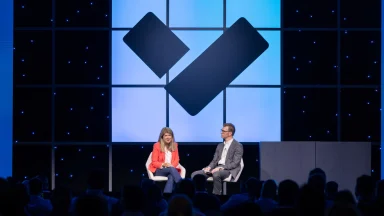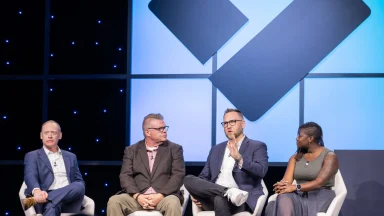Better Security with an Integrated System: Key Topics from the VerkadaOne Panel Discussion
VerkadaOne, our three-day industry conference, brought together experts from across the country to network, share insights and learn about the latest physical security trends. During the conference, Verkada hosted industry-specific panels and breakout sessions, including the customer panel discussion, "Better Security with an Integrated System."
The session, hosted by Raj Misra, Verkada VP of Hardware Engineering, consisted of a wide-ranging conversation with industry leaders Jamin Horton (Camping World's Director of IT), Devon King (Canada Goose's Senior Security Manager of Security Operations) and Glenn Master (McLane's Director of Asset Protection and Security).
Below are some key topics that came up during this fireside chat.

1. Managing Numerous Disparate Systems Isn’t a Viable, Long-Term Approach
Unfortunately, the panelists are all aware of the difficulty of managing a large-scale deployment and bridging together various security systems. Jamin Horton shared that when he first joined Camping World, their physical infrastructure varied location by location, which necessitated complex system configurations and a massive workload for his four-person team: "We had 60 disparate systems, and trying to manage them all with a small team was untenable."
Devon King underscored the headaches of managing Canada Goose's disparate systems, including connecting siloed data from different devices and maintaining unreliable servers. As Devon mentioned, he "inherited an aging, disparate system across multiple platforms, with local servers that required continuous, labor-intensive maintenance."
There are viable solutions out there that have alleviated these issues, though. Jamin was able to reduce the complexity and maintenance that came with managing 60 disparate security systems with Verkada:
"I enjoyed bringing together all these different systems we manage — cameras, access control, and alarms — all under a single, integrated platform. Our lives are much easier operationally."

2. Unlocking More ROI With Integrated Security Systems
McLane's Glenn Master has over two decades' worth of experience in the physical security industry, giving him a wealth of knowledge regarding the industry's changes. One of the areas that surprised Glenn was how McLane's safety and operations teams are leveraging Verkada for use cases outside the umbrella of physical security, leading to a higher demand for the product:
"The operations team has unlocked another ROI-driving use case for our distribution centers. In an effort to improve efficiency and safety, they're having security guards monitor trucks as they enter and leave our facilities. This saves a lot of time during the check-in and checkout processes."
Working within the retail industry, Devon is always trying to find ways to protect Canada Goose from liability concerns, such as theft. Devon shared how other internal teams are beginning to utilize the platform to improve business outcomes as they learn how Verkada can deliver real-time insights with AI-powered tools: "Our marketing is using heatmapping and the occupancy trends to strategize product placement in our retail stores."
Devon further explained that by tying cameras, access control, alarms, sensors and data analytics into a single, unified platform, Canada Goose is optimizing retail operations and enhancing customer service. These benefits demonstrate how integrated security systems can become an integral component of a broader business strategy.

3. Completing Investigations in Hours, Not Weeks
Investigations are a crucial aspect of Glenn and Devon's roles at their organizations, so there was a lot of back and forth on the topic. Glenn's extensive experience has given him a front-row seat to how the process of conducting investigations has evolved over the past 20+ years:
"I remember the days when we had to pull VHS tapes; you would spend eight to ten hours reviewing footage. And the technology only allowed for about ten days worth of recording. Now, it's amazing how fast we can pull data for investigations, which now only takes 15 to 20 minutes. I can start an investigation in the morning and, by lunch, have enough video evidence to present to our executive management."
Glenn wasn't the only panelist who has seen improvements in the process. Devon spoke at length on how "parsing together data for an investigation, whether it's through the access control system, camera coverage or the person of interest feature," saves his team a significant amount of time when packaging and sending footage to the authorities.
Furthermore, Devon highlighted how the Verkada integrated platform made it a breeze to investigate alarm events and thwart theft. He added, "The ability to pull all the data we need has saved us time and money, helping us apprehend suspects efficiently."
This efficiency is enormous for organizations like McLane and Canada Goose because, as Devon so eloquently put it: "time is money."

4. Limiting the Headaches and Costs of Multi-Site Deployments
The issues that come with deploying a security solution across multiple locations can vary for each organization. But as discussed by all three panelists, these hurdles — ranging from poor installation experiences to complex user management — can significantly impact an organization's security and even its bottom line.
Jamin emphasized the importance of having trustworthy integration partners, especially for a geographically dispersed company like Camping World. Not doing so could delay deployments and increase installation costs in the long run:
"One of the problems with having so many stores is finding an integrator for each location that is familiar with the product line. Don't shortchange yourself by using a fly-by-night, third-party integrator. We, unfortunately, learned that lesson the hard way."
Devon and Glenn also spoke about the importance of setting site-level permissions and how they helped ensure that only the right employees had access to their systems. For Glenn, that means limiting who has exposure to camera footage:
"In a typical security fashion, you obviously want to limit people's exposure to what they're looking at and have access to. We have 82 distribution centers, each with workers and security guards that need varying degrees of access to our system."
As for Devon, that can entail enabling district managers "to be able to arm alarms remotely" or "giving store managers view-only access to the cameras on-site."

5. Tracking Assets and Monitoring Vehicles Top Their Wishlists
Despite the significant innovations that have come onto the scene, the panelists still have a wishlist of features and capabilities they hope to see in the near future.
In Glenn's case, it's all about providing an extra layer of security for McLane's drivers when they're on the road. He would love to see "remote monitoring for vehicles, like a virtual security guard identifying risks and securities closures." As Glenn explained, it would be great to have "a second set of eyes" helping drivers spot possible security risks.
Both Jamin and Devon have to protect inventories of big-ticket items, so of course, the capability they most want is comprehensive asset tracking. However, the application of the feature would differ between the two. As Jamin mentioned, "For us, it would probably be asset tracking. We're constantly moving campers and RVs around, and stores often need help locating them on-site."
For Devon, it's more about loss prevention:
"From a retail perspective, inventory tracking as a deterrence for theft would be very powerful. For example, once a product leaves a store, the platform could automatically trigger an alert and tag the clip so you can find it within Command. Integrating that data into the system would allow us to track the entire lifecycle of a product and curb theft in our stores."
One of the biggest takeaways from this panel discussion with Jamin, Devon and Glenn was how much untapped potential integrated systems have. As organizations explore alternative applications and identify possible improvements to physical security technology, solution providers must keep up with their customers' evolving needs.
For us here at Verkada, that means continuing to deliver the best product experience possible for end users through meaningful dialogue, ongoing product innovation and reliable technical support.





